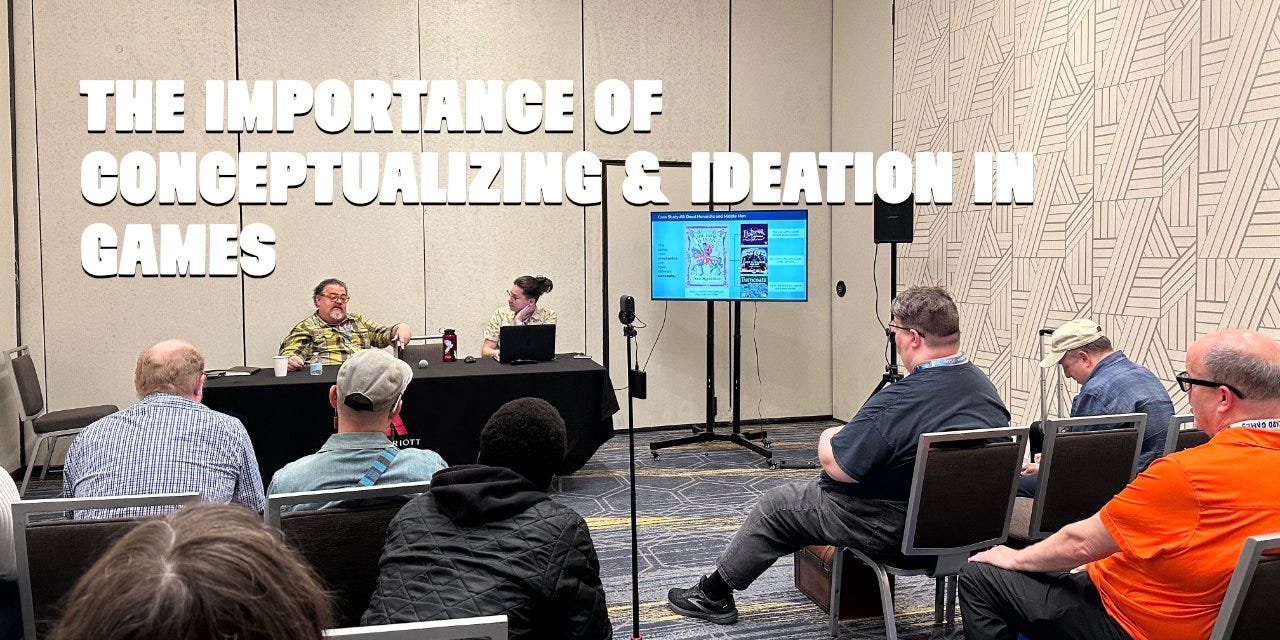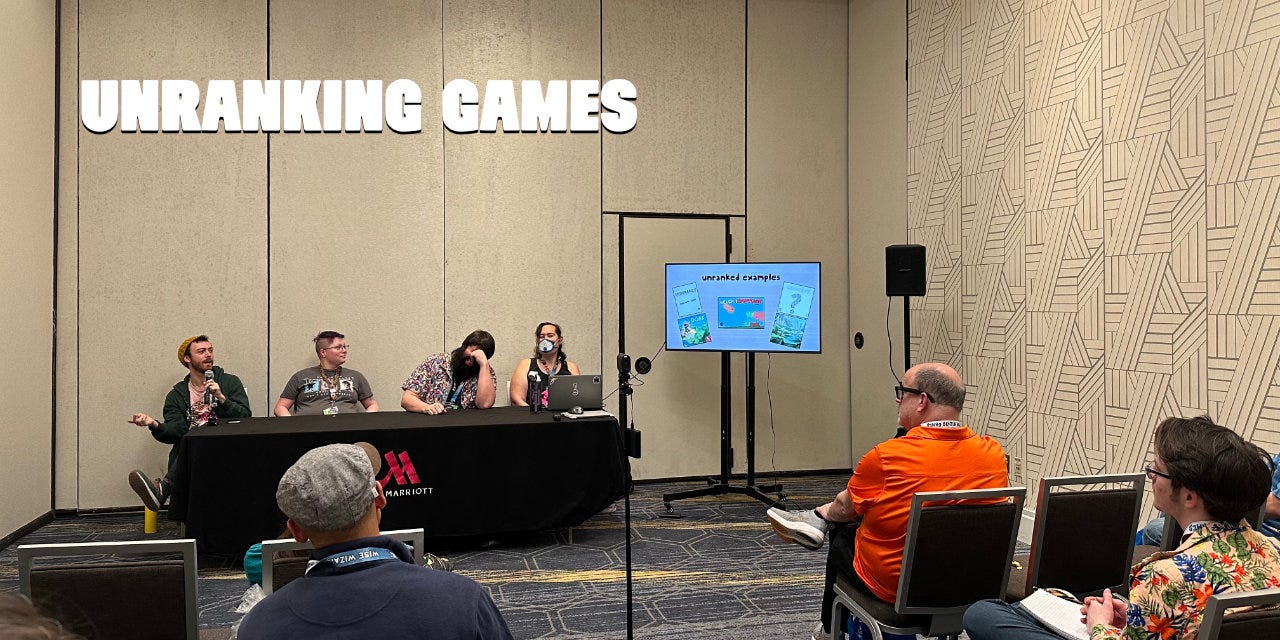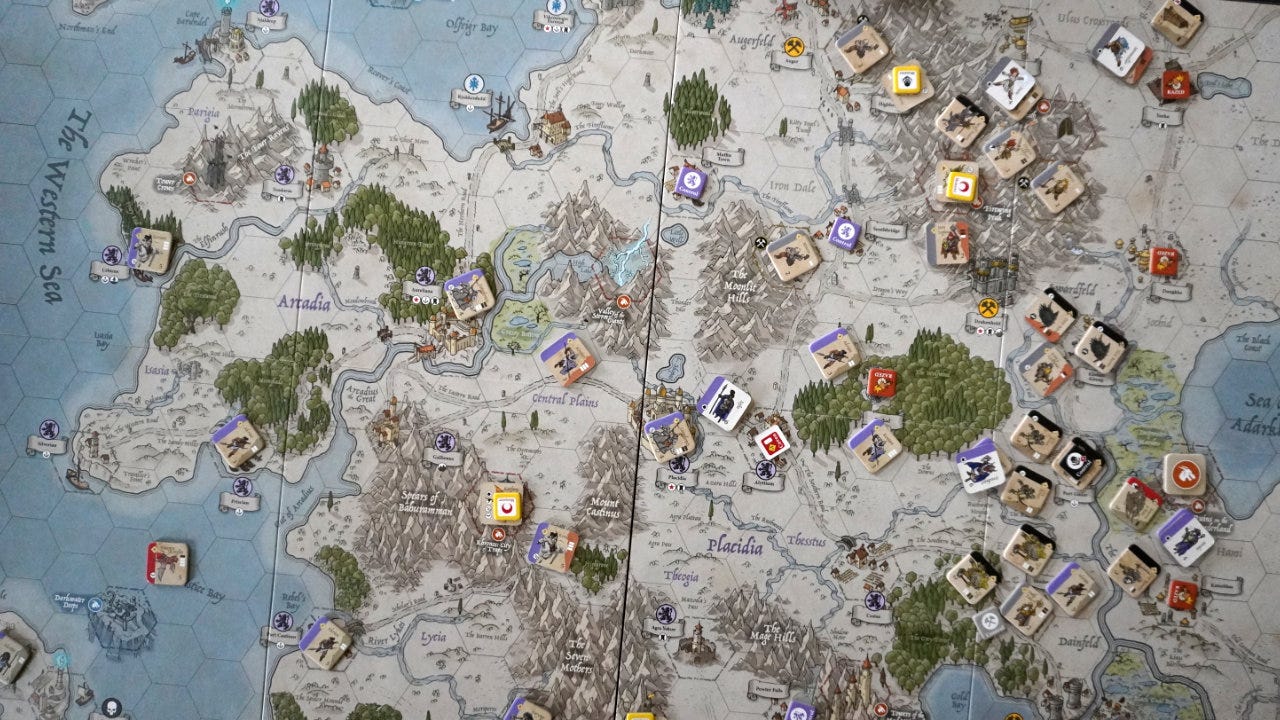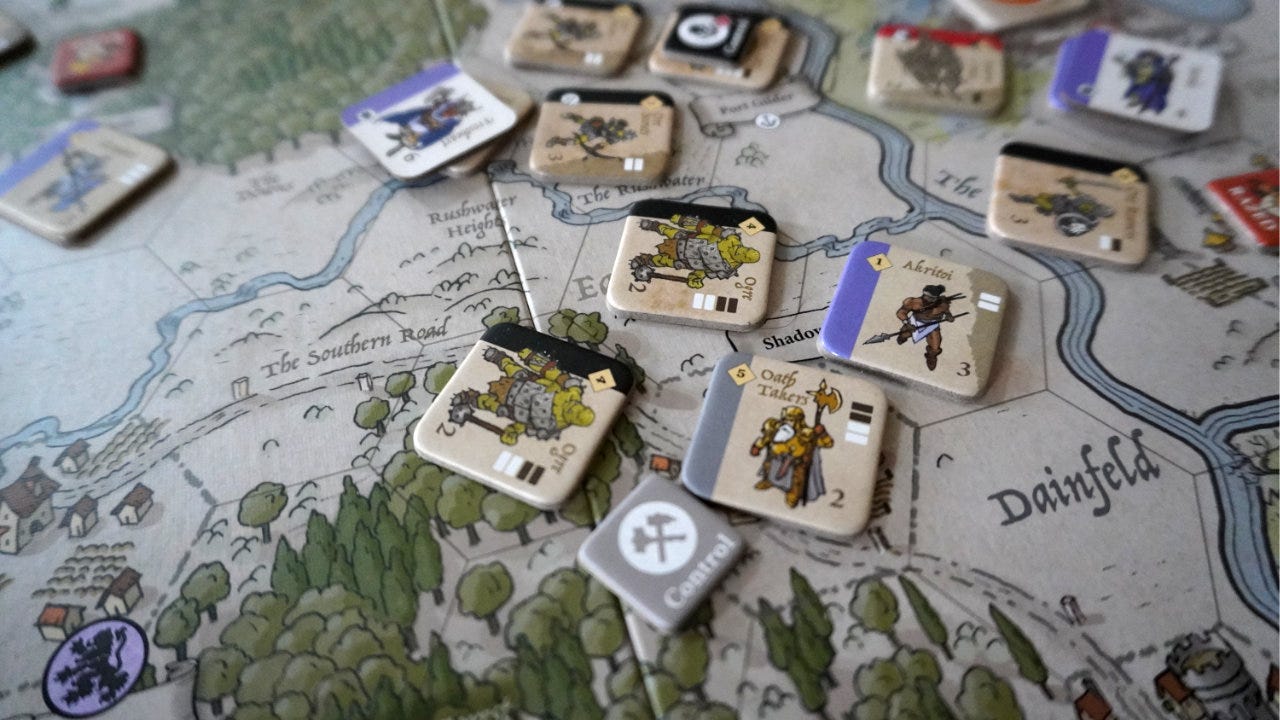🧑🏫What I learned from 4 panels at Unpub
ADVENTURE! Pre-Order Bundle ending soon, Tumulus 3 coming in June, reflecting on Unpub 2025 panel discussions about prototypes, math, game concepts, and unranked games. Also, playing Burning Banners!
Welcome to Exeunt Omnes, the official newsletter for loyal fans and sworn enemies of Exeunt Press, creator of games such as Exclusion Zone Botanist and Eleventh Beast. You can find digital games at games.exeunt.press and physical products at shop.exeunt.press.
TL;DR Summary
💀 Exeunt Press updates
🧑🏫Reflecting on Unpub 2025 panel discussions
🎲 Recently played: Burning Banners
💀 Exeunt Press updates
⚔️ ADVENTURE: The first print run of ADVENTURE! Make Your Own TTRPG Adventure should arrive later this week! Assuming the printer’s shipping estimate is correct and that they look good when they arrive, this means that ADVENTURE! Pre-Order Bundles may begin shipping as early as next week. You still have a few days to place your order to get the book plus the adventures referenced in the guide.1
🌿 Exclusion Zone Botanist: Epsilon: Writing and design continues as Trophy Dark is adapted for solo play in the world of Exclusion Zone Botanist. The pre-launch page is up, and it will launch when the game is complete. My goal is to run the campaign and ship as soon as possible after it ends.
🩻 TUMULUS Issue 3: The third issue of Tumulus is underway and I’m working on layout for it. It will have two special guest contributors: Jesse Ross (Trophy Dark) and Hinokodo (MIRU). Issue 3 will ship in June 2025.
SHOP: ADVENTURE! Pre-Order Bundle at the Exeunt Press Shop
🧑🏫 Reflecting on Unpub 2025 panel discussions
My recent experience at Unpub 2025 continues to capture my attention. I’ve been trying to organize some of my thoughts by writing at Skeleton Code Machine:
Thursday (Designer Day) was a great intro to the event and was packed with high quality panel discussions and presenters.2 Here are the ones I attended with a few thoughts or notes from each:
1. Prototyping Tips (Hunter Johnson, Jay Bell, TAM, Josh Tempkin)
Prototype as early as you can and remove barriers to iterative design. Don’t laminate things too early. Leave blank space for changes.
You don’t need to buy a lot of pieces and equipment. Glass beads are cheap. Label cutters can cut tokens too.
You are ready to pitch when players enjoy the game, have no more crazy rule questions, and feedback is no longer significantly changing the game.
2. Mathematics for Game Design (Edward Damon)
Math can be a useful tool in game design. Example of predicting how often a “one-turn play” is, meaning the game would end far too early.3
I should look into normal form games, representing games as a payoff matrix, and Nash equilibria. Good to start with simple games like Stag Hunt.
Use Python to simulate simple mechanisms in games.
3. The Importance of Conceptualizing & Ideation in Games (Christopher Chan, Chris O'Neill)
Gamers are becoming more sophisticated consumers. Cool mechanics and theme are not enough. Need a concept — the execution of theme + mechanism as an experience.
A concept is different than just the theme. Example of different Lord of the Rings games with same theme but different concepts.
Adopt a concept-first mindset. Make your title the pitch. Communicate your concept and make it part of the playtest by asking questions about it.
4. Unranking Games (Xoe Allred, Vicki Langer, Matthew Hocker)
A continuum from ranked games (1st/2nd place, zero sum view), multivictor games (enough vs. most, individual goals, possibly everyone loses), victorless games (narrative outcomes, map of destinations).4
In unranked games “there is no win state, but instead outcomes or moments players may pursue.” Party games where you “play until done” and roleplaying games are naturally unranked.
Our lives are often zero sum games, so it is the natural way to look at things. But why does a cozy garden game need to have a winner?
Still need to give players a trajectory, goals, and objectives.
Cooperative games are different in some ways, as they force collaboration rather than allowing players to choose to work together.
End game conditions can be a challenge: fixed N rounds, event trigger (deck or resources), thresholds, and/or meet goals.
Create scarcity in the game even if it is not a competitive game.
There were also a number of panels on Friday that I attended:
Wings, Wyrms, and Fins (Elizabeth Hargrave, Connie Vogelmann, David Gordon)
Manufacturing 101 (Clark Bender, Jay Bell)
Solo Rules Design (Mike Mullins)
Possibilities of Play - Board Games for Skill Building (Jack Berkenstock)
Keynote: Suz’s Fireside Chat (Suzanne Sheldon)
It is worth noting that Unpub isn’t just for board games. There were TTRPGs being playtested as well. One of the things I appreciated was that all types of tabletop games were welcome, blurring the line between the usual definitions (i.e. board game vs. roleplaying game). If you make any sort of tabletop game, I think you’d be welcome to demo your game and playtest there.
READ: How to Pitch Your Game at Skeleton Code Machine
Skeleton Code Machine is an ENNIE-nominated weekly publication that explores tabletop game mechanisms. It’s been called a “Seemingly endless source of gaming ponderings” and a “Goldmine.” Check it out at www.skeletoncodemachine.com.
🎲 Recently played: Burning Banners
I was fortunate enough to get a chance to play Burning Banners again — this time with four players (2v2) and two of the map sections. I can’t imagine playing with all four maps, because this maxed out the space on my table!
The understated art and gorgeous map immediately hooked me, but the gameplay is really solid. It’s a wargame, but one with some euro-game action efficiency sensibilities. This time we tried the advanced rules which add heroes, magic, and monsters. Definitely made it a longer game vs. the basic rules, but also a lot more satisfying.
In the end, our Orc and Army of the Night alliance failed to invade the Fields of Ash and Imperial Heartland, blocked by the Eastern Empire and Oathborn armies. Maybe next time…
PLAY: Burning Banners by Christopher Moeller
Thanks for subscribing to Exeunt Omnes!
Check out games.exeunt.press for all the latest games and resources!
- E.P. 💀
You can get the PDF right now. The book will be available sans bundle after the pre-order closes. It will include the book and PDF together.
I’m usually disappointed by the panels and presentations at conventions. Not because of the quality of the presenter, but because the topics are usually not what I’m looking for and/or they are at such a high level that I feel like I didn’t learn enough. Unpub’s seem to hit better, and I’m not sure why. Perhaps a combination of topics, depth, highly engaged audience, or something else.
I wrote about this in Muffins and the Risk of Being Eaten, where I used Python to simulate how many turns would be played (on average) in a typical game of You are a Muffin. Observant players have noticed that in both You are a Muffin and Exclusion Zone Botanist, the Risk Value (RV) chart ensures that the game will never end prematurely in the first few turns.
Semi-cooperative games such as Nemesis were mentioned a few times during this presentation, and I think that game is a good example. I wrote about it in I’m not the traitor. Trust me. at Skeleton Code Machine.








